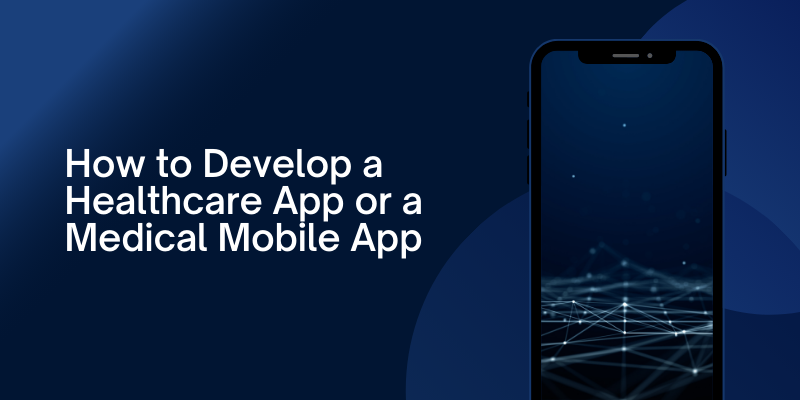How to Develop a Healthcare App or a Medical Mobile App

2020 was historic, not just in our personal lives but also in the market for health apps. CB Insights reports that healthcare app development services have seen a massive increase in investment, with nearly 300%. This includes health education, remote patient monitoring, and remote doctor-patient consults.
A medical startup is created by analyzing ideas, trends, and development stages.
Digitization of the medical industry has made healthcare more affordable and accessible to all, including those in underprivileged areas. The pandemic has made the demand for medical technology even more apparent, and the market has grown and expanded to meet it.
Healthcare applications connect doctors and patients and provide a smooth and easy communication channel. The technology allows doctors more precision in diagnosing and treating patients, while the patient can receive professional help from home. Building a medical application requires much legal and technical expertise, thorough planning, and experienced human resources.
Features that Make a Health App Successful
Building a health application may require various features, including live video conferencing. Some of these features are essential for creating a medical app on iOS or Android.
User profile
The app should allow users to manage and create their health profiles. This includes controlling the data and information it can access. Most creators gather basic information at signup to make medical applications more personalized. This includes name, contact details, age, height, and weight.
Dashboard
You will confuse users if you create a healthcare application without a dashboard. The dashboard provides users with an overview of their records. Also, it serves as a visual record and activity summary for the most critical health metrics.
Chatting and Messaging
Chat and messaging are essential in medical mobile apps where doctors and patients must communicate. This feature can be integrated into other mobile medical applications to allow users to interact with members of different support groups to encourage each other to achieve their health goals. In both situations, a chatbot can be incredibly useful. You can learn more about the cost of chatbots and other details in our blog.
Reminders and Notification
When creating a healthcare application, remember that these programs are not passive. They are interactive. They require the user to perform specific actions in response to app suggestions. This is also something to keep in mind for healthcare app development solutions. App reminders are a great way to remind users of the health and fitness goals they have set for themselves.
Cloud Integration
Each user should have access to patient data at all times. Cloud integration allows users to access their data and health records anytime.
Privacy and security
Developers of health apps should always keep privacy and security at the forefront, as health apps collect sensitive and confidential data. Data encryption, multifactor verification, etc., are all part of this.
Secure Payment Processing
You need to have a secure payment processing system that does not reveal sensitive data about your customers unless you offer a free app. For a better user experience, payment processing should be fast, smooth, and seamless.
Analytics Integration
It is vital that you collect enough data so that your app can function better. Ask users for permission before sharing or collecting any data. Each health app, including Samsung Health, iOS Health, Google Fit, etc. Data is collected and integrated.
Some features are optional but helpful depending on how you create your medical app.
- Wearable device integration
- Goal setting
- Social sharing integration
- Gamification
- Video tutorials
- Appointment management, et cetera.
How To Develop A Healthcare App Or A Medical Mobile App
Here are some steps that you need to take to develop a healthcare application.
Identify the Target Audience
It is essential to know how to create a medical application. Already, the mobile healthcare industry is saturated. Before you create a mobile healthcare app, you must do extensive research on your target audience to determine the problems your app needs to solve.
Nike Training Club is aimed at amateur and professional athletes. Your audience’s needs will dictate the features you introduce when building your app.
Pre-Development
Then, you need to create a plan for how to build a medical application. Decide on the specifications and requirements you need to develop your app, including functionalities, costs, resources, and personnel.
At this stage, you can determine the types of professionals required, tools and technologies needed, the technology stack for development, certification requirements (government), the development cost (budget), etc.
Build MVP
The next step is to develop an MVP. When creating a healthcare app MVP, it’s essential to follow the basic rules of MVP creation: make it fast and viable.
You should prioritize features essential to the app, ensure they solve the issue, and then iterate continuously. MVPs give you an advantage over full-blown products because they allow you to enter the market quickly and gather feedback.
Development
It is essential to start with a minimal viable product (MVP) and add new features and functions as you test. The project plan should guide the entire development process when building healthcare applications.
You have two options: either hire an in-house development team or work with a team of offshore developers.
JPLoft builds development teams from its pool of engineers and developers, who have all proven their expertise during the hiring process. We can reduce your recruitment costs and time, allowing you to get to market faster and with a more cohesive team.
Quality Assurance
This is a crucial stage. Suppose you want to create a healthcare app that is both reliable and secure. In that case, you need to hire professional healthcare app developers and QA engineers. It doesn’t matter how much testing or debugging the developers do. However, they must still rely on QA testing to eliminate blind spots.
Product Release and Continuous Support
After the app has been deployed, it will still need support. Many companies delegate the app’s development to the internal team at this stage. It may be necessary to iterate the app continuously to achieve full stability.
Various Types of Healthcare Applications
Study the best-known ones to learn how to make a successful health app. You can also look at their features.
Lifestyle Tracking Applications
These apps analyze the health and fitness of patients by tracking metrics like heart rate, sleep patterns, physical activity, calorie intake, and other activities, such as menstrual cycles in women. Google Fit, Sleep as Android, and Map My Fitness are some of the apps.
Some apps offer services tailored to specific conditions, such as tracking the development of a fetus in pregnant women. Some apps offer a complete diet plan tailored to the user’s health condition and needs.
Fitness Apps
Fitness apps provide general and personalized guidance and coaching for those wanting to become more physically active. Some apps offer custom workouts, particularly for those who do not have access to gym gear. Yoga apps are also included in this category. Sworkit, Nike Training Club, and other popular fitness apps are formed in this category.
Health Counselling Apps
You can book sessions with doctors, therapists, and specialists via video or chat. These apps, such as MDLIVE Doctor on Demand and Talkspaceare, can be used for non-emergency diagnoses or issues when you do not have immediate access to your physician.
Meditation Apps
Some of the apps that users can use to improve their well-being include guided meditations, mindfulness exercises, and other tools. Headspace, Calm, and Insight Timer are some of the most popular meditation apps. How do you make a meditation application? JPLoft offers a Discovery Phase that will give you a complete development plan for your application!
Conclusion
How do you develop a health app? If you have the resources, it is a complex but doable project.
JPLoft, a renowned healthcare app development agency has extensive experience in the development of healthcare apps. We know how to create HIPAA-compliant software, from research to a product ready to launch.
It is a challenging process to develop a mobile app for healthcare. Balancing high budgets with HIPAA compliance and data security can be difficult, and your team may feel the strain. You can get technical assistance if you want to create a secure medical app.
You may face some challenges when you want to create a healthcare application. These include user research and data protection. You may have to deal with sensitive issues when interviewing potential customers. Asking about the methodology and not personal matters will help you to make your research easier. Note that your app should be HIPAA compliant and follow all rules. You risk a fine if you don’t.




